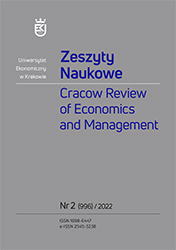Research Challenges Concerning Employees Doing Enforced Remote Work
DOI:
https://doi.org/10.15678/ZNUEK.2022.0996.0202Słowa kluczowe:
wymuszona praca zdalna, zachowania pracowników, zarządzanie pracownikami wykonującymi pracę zdalną, praca hybrydowaAbstrakt
Tytuł artykułu: Wyzwania badawcze dotyczące pracowników w sytuacji wymuszonej pracy zdalnej
Cel: Identyfikacja wyzwań badawczych, przed którymi stoją naukowcy i praktycy poszukujący skutecznych rozwiązań w zakresie kształtowania zachowań pracowników w sytuacji wymuszonej pracy zdalnej.
Metodyka badań: Przegląd i analiza literatury, wyniki badań ankietowych oraz wyniki warsztatów tematycznych dla menedżerów.
Wyniki badań: Sformułowanie definicji wymuszonej pracy zdalnej oraz wskazanie propozycji obszarów badawczych i ograniczeń metodologicznych.
Wnioski: W artykule przyjęto tezę o istotnej różnicy między warunkami wpływającymi na sposób pracy pracowników: podczas pracy zdalnej i podczas wymuszonej (nieplanowanej) pracy zdalnej. Scharakteryzowano i uporządkowano uwarunkowania wpływające na zachowania pracowników podczas wymuszonej pracy zdalnej, a także wskazano obszary wyzwań praktycznych, przed którymi stoją menedżerowie zarządzający pracownikami wykonującymi pracę zdalną.
Wkład w rozwój dyscypliny: Autorzy sformułowali przyszłe wyzwania badawcze w obszarze narzędzi zarządzania pracownikami w warunkach wymuszonej pracy zdalnej i pracy hybrydowej oraz poszukiwania zależności między uwarunkowaniami takiej pracy a jej efektywnością.
Downloads
Bibliografia
Anderson A. J., Kaplan S. A., Vega R. P. (2015), The Impact of Telework on Emotional Experience: When, and for Whom, Does Telework Improve Daily Affective Well-being?, “European Journal of Work and Organizational Psychology”, vol. 24(6), https://doi.org/10.1080/1359432X.2014.966086.
Ayoko O. B., Ang A. A., Parry K. (2017), Organizational Crisis: Emotions and Contradictions in Managing Internal Stakeholders, “International Journal of Conflict Management”, vol. 28(5), https://doi.org/10.1108/IJCMA-05-2016-0039.
Biron M., Veldhoven M. van (2016), When Control Becomes a Liability Rather than an Asset: Comparing Home and Office Days among Part-time Teleworkers, “Journal of Organizational Behavior”, vol. 37(8), https://doi.org/10.1002/job.2106.
Boell S. K., Cecez-Kecmanovic D., Campbell J. (2016), Telework Paradoxes and Practices: The Importance of the Nature of Work, “New Technology, Work and Employment”, vol. 31(2), https://doi.org/10.1111/ntwe.12063.
Burrell D. N. (2020), Understanding the Talent Management Intricacies of Remote Cybersecurity Teams in Covid-19 Induced Telework Organizational Ecosystems, “Land Forces Academy Review”, vol. 25(3), https://doi.org/10.2478/raft-2020-0028.
Choudhury P., Crowston K., Dahlander L., Minervini M. S., Raghuram S. (2020), GitLab: Work Where You Want, When You Want, “Journal of Organization Design”, vol. 9(1), https://doi.org/10.1186/s41469-020-00087-8.
Choudhury P., Foroughi C., Larson B. (2020), Work-from-anywhere: The Productivity Effects of Geographic Flexibility, “Strategic Management Journal”, vol. 42(4), https://doi.org/10.1002/smj.3251.
Çoban S. (2021), Gender and Telework: Work and Family Experiences of Teleworking Professional, Middle-class, Married Women with Children during the Covid-19 Pandemic in Turkey, “Gender, Work & Organization”, https://doi.org/10.1111/gwao.12684.
Collins A. M., Hislop D., Cartwright S. (2016), Social Support in the Workplace between Teleworkers, Office-based Colleagues and Supervisors, “New Technology, Work and Employment”, vol. 31(2), https://doi.org/10.1111/ntwe.12065.
Dolot A. (2020), Wpływ pandemii COVID-19 na pracę zdalną – perspektywa pracownika, “E-mentor”, vol. 1(83), https://doi.org/10.15219/em83.1456.
Eriksson E., Petrosian A. (2020), Remote Work-transitioning to Remote Work in Times of Crisis, UMEA School of Business, Economics and Statistics, UMEA University, http://umu.diva-portal.org/smash/get/diva2:1446999/FULLTEXT01.pdf (accessed: 21.02.2022).
Fonner K. L., Stache L. C. (2012), All in a Day’s Work, at Home: Teleworkers’ Management of Micro Role Transitions and the Work-home Boundary, “New Technology, Work and Employment”, vol. 27(3), https://doi.org/10.1111/j.1468-005X.2012.00290.x.
Hilbrecht M., Shaw S. M., Johnson L. C., Andrey J. (2008), “I’m Home for the Kids”: Contradictory Implications for Work-life Balance of Teleworking Mothers, “Gender, Work and Organization”, vol. 15(5), https://doi.org/10.1111/j.1468-0432.2008.00413.x.
Izdebski Z. W., Mazur J. (2021), Changes in Mental Well-being of Adult Poles in the Early Period of the COVID-19 Pandemic with Reference to Their Occupational Activity and Remote Work, “International Journal of Occupational Medicine and Environmental Health”, vol. 34(2), https://doi.org/10.13075/ijomeh.1896.01778.
Klerk J. J. de, Joubert M., Mosca H. F. (2021), Is Working from Home the New Workplace Panacea? Lessons from the COVID-19 Pandemic for the Future World of Work, “SA Journal of Industrial Psychology”, vol. 47, https://doi.org/10.4102/sajip.v47i0.1883.
Maltseva I., Shulgina Y., Kalimov O. (2020), Features of Social and Labour Monitoring in the Conditions of Transition to Remote Employment, “Economic Annals-XXI”, vol. 186(11–12), https://doi.org/10.21003/ea.V186-16.
Narayanamurthy G., Tortorella G. (2021), Impact of COVID-19 Outbreak on Employee Performance Moderating Role of Industry 4.0 Base Technologies, “International Journal of Production Economics”, vol. 234(C), https://doi.org/10.1016/j.ijpe.2021.108075.
Ozturk P., Avci C., Kaya C. (2021), The Effect of Remote Collaborative Work on Design Processes during the Pandemic, “Strategic Design Research Journal”, vol. 14(1), https://doi.org/10.4013/sdrj.2021.141.10.
Perlow L. A., Kelly E. L. (2014), Toward a Model of Work Redesign for Better Work and Better Life, “Work and Occupations”, vol. 41(1), https://doi.org/10.11770700888413516473.
Prodanova J., Kocarev L. (2021), Employees’ Dedication to Working from Home in Times of COVID-19 Crisis, “Management Decision”, vol. 603, https://doi.org/10.1108/MD-09-2020-1256.
Putnam L. L., Myers K. K., Gailliard B. M. (2014), Examining the Tensions in Workplace Flexibility and Exploring Options for New Directions, “Human Relations”, vol. 67(4), https://doi.org/10.1177/0018726713495704.
Raišienė A. G., Rapuano V., Varkulevičiūtė K. (2021), Sensitive Men and Hardy Women: How Do Millennials, Xennials and Gen X Manage to Work from Home?, “Journal of Open Innovation Technology, Market, and Complexity”, vol. 7(2), https://doi.org/10.3390/joitmc7020106.
Solís M. S. (2016), Telework: Conditions that Have a Positive and Negative Impact on the Work-family Conflict, “Academia Revista Latinoamericana de Administración”, vol. 29(4), https://doi.org/10.1108/ARLA-10-2015-0289.
Stankevičienė A., Tamaševičius V., Diskienė D., Grakauskas Ž., Rudinskaja L. (2021), The Mediating Effect of Work-life Balance on the Relationship between Work Culture and Employee Well-being, “Journal of Business Economics and Management”, vol. 22(4), https://doi.org/10.3846/jbem.2021.14729.
Taylor J. C. Jr (2020), From the CEO: Remote Work and an Inequity Time Bomb, “HR News, Society for Human Resource Management”, https://www.shrm.org/hr-today/news/hr-magazine/winter2020/pages/from-the-ceo-remote-work-and-an-inequity-time-bomb.aspx (accessed: 10.03.2022).
Vega R. P., Anderson A. J., Kaplan S. A. (2015), A Within-person Examination of the Effects of Telework, “Journal of Business and Psychology”, vol. 30, https://doi.org/10.1007/s10869-014-9359-4.
Wilkie D. (2017), Remote Workers Feel Productive but Also Guilty, “HR News, Society for Human Resource Management”, https://www.shrm.org/resourcesandtools/hr-topics/employee-relations/pages/remote-workers-feel-guilty-.aspx (accessed: 9.03.2022).
Williams L. (2021), What’s Required for Remote Employees?, “Canadian HR Reporter”, vol. 34(4), https://www.hrreporter.com/focus-areas/employment-law/whats-required-for-remote-employees/355826 (accessed: 11.12.2021).
Zdonek I., Podgórska M., Hysa B. (2017), The Competence for Project Team Members in the Conditions of Remote Working, “Foundations of Management”, vol. 9(1), https://doi.org/10.1515/fman-2017-0017.




